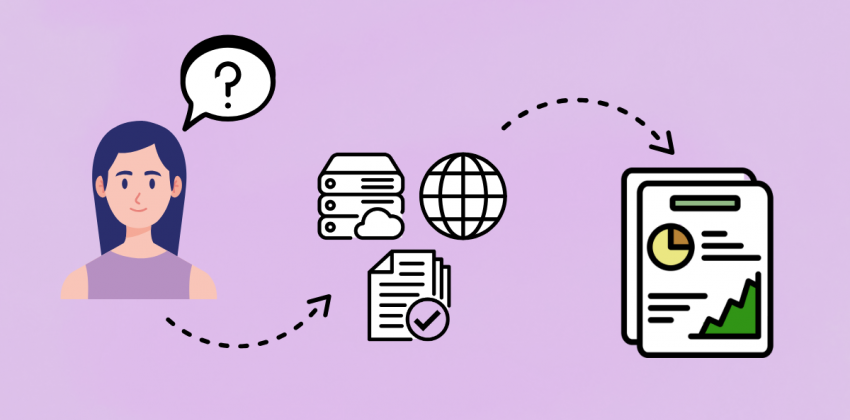Commercial Information: what it is, what it’s for, and why it’s essential
From partner verification to risk assessment, everything you need to protect your business in real time and via API.

Commercial information (or business information) consists of structured data about companies, professionals, and individuals, collected to evaluate reliability, solvency, and reputation. It is not just numbers, although it is generally based on official data. The best sources also provide interpretations and predictive indicators, turning raw data into insights useful for making more informed decisions, for example through detailed reports.
Table of Contents
- Types of Business Information: Companies and Individuals
- What Is Business Information Used For?
- Key Business Information to Know:
- Why Are They So Important?
- Which Data Are Included for Individuals
- Main Benefits of Using Business Information
- Examples of Business Information Use
- What Are the Data Sources?
- Business Information via API: Real-Time Integration with Business Systems
- Openapi: Real-Time Business Information via API
They are used to verify a business partner, prevent insolvencies, assess credit risk, and support strategic decisions in commercial, financial, and legal contexts.
In modern business, making informed decisions is no longer optional: it is a necessity. Commercial information is a fundamental resource in this context, as, if used properly, it can decisively influence a company's destiny, determining its success or failure.
In this article, we will explore the nature of commercial information, the types of data they provide, the benefits of their application, and how to automatically integrate them into company systems through APIs.
Types of Business Information: Companies and Individuals
As previously mentioned, business information can relate to:
- Legal entities / Companies: Data on financial statements, protests, corporate roles, administrative structure, certifications, insolvency procedures, legal issues, and company history.
- Individuals: Information on real estate ownership, protests, company shares, company roles, legal procedures, and financial situation.
What Is Business Information Used For?
Business information is used to:
- Evaluate the insolvency risk of a partner or customer.
- Gain assurance on suppliers' financial stability.
- Identify new opportunities: industry trends, market size, growth forecasts, and business potential.
- Support strategic business decisions.
- Develop profitable business relationships.
- Prevent fraud or non-transparent behavior in business dealings.
Key Business Information to Know:
1. Company Details
- Company name, VAT number, tax code.
- Registered office and local branches.
- Corporate purpose, articles of association.
- Operational status.
- Date of incorporation and registration.
- Economic Activity Classifications (e.g. ATECO, SIC, NACE codes and descriptions).
2. Economic and Financial Information
- Revenue, profit, net worth, debt.
- Financial performance over recent years.
- Filed financial statements.
- Solvency and liquidity indicators.
3. Legal Information
- Chamber of Commerce registrations and certificates.
- Insolvency proceedings (bankruptcies, arrangements, liquidations).
- Legal warnings and protests.
- Any ongoing or past legal disputes.
4. Economic and Financial Assessments
- Credit rating or reliability score.
- Predictive analysis of insolvency risk.
- Customized risk classification.
5. Company People Information
- List of directors and shareholders and their ownership percentages.
- Corporate structure and related holdings.
- Changes in company roles or appointments.
- Links between companies (groups, holding companies, affiliates).
Why Are They So Important?
Business information allows you to easily verify the health of a subject and anticipate risks such as insolvency, problematic clients, unprofitable relationships, or unreliable suppliers, especially:
- Reducing credit risk.
- Supporting growth and customer acquisition strategies.
- Providing a detailed snapshot of companies’ or individuals’ financial health.
- Helping assess the reputation and stability of partners and clients.
They are also essential for credit managers, compliance officers, partner analysts, and companies expanding into new markets.
Which Data Are Included for Individuals
- Personal and residential data.
- Verification of life status (in specific cases).
- Protests and bad payer reports.
- Corporate roles and shareholdings.
- Real estate and vehicle ownership.
- Ongoing or past legal proceedings.
Main Benefits of Using Business Information
- Reduced insolvency risk: by knowing a customer’s or supplier’s reliability in advance.
- Optimized credit management: better decisions on granting payment terms.
- More informed business decisions: supporting investments, partnerships, and commercial strategies.
- Competitive advantage: improved market and competitor monitoring.
- Fraud prevention: detecting warning signs before closing deals.
Examples of Business Information Use
- Before partnerships or M&A to assess the counterparty.
- Credit management and debt collection activities.
- Identifying new markets or customer segments.
- Periodic customer screening to detect issues early.
What Are the Data Sources?
This information is collected from official sources such as:
- National Company Registers (e.g., Chamber of Commerce).
- Official land registry databases.
- Official conservatory and court databases.
- Judicial and administrative authority databases.
- Sector databases and rating agencies.
- Licensed investigative companies.
Using business information has become essential for any company that wants to operate safely, competitively, and intelligently in today’s market. Instant access to this data enables fast, secure, and growth-driven decisions.
Business Information via API: Real-Time Integration with Business Systems
In recent years, APIs (Application Programming Interfaces) have also revolutionized business information, enabling fast, automatic, and scalable data access. Through APIs, companies and software can query commercial databases in real time, integrating the information directly into management systems (CRM, ERP, e-commerce platforms, customer onboarding tools, etc.).
Key benefits include:
- Process automation: no more manual searches or downloads.
- Real-time responses: immediate checks on company details, protests, reliability scores.
- KYC and AML controls: regulatory compliance.
- Flexible integration: each workflow can be adapted to business needs (e.g., customer checks before order placement, partner onboarding, risk pre-assessment).
Openapi: Real-Time Business Information via API
Openapi is one of Europe’s leading providers of business information via API, known for its data quality, considered a true corporate asset. Every piece of information comes exclusively from official and certified sources and is handled according to the highest security and transparency standards.
We are among the very few companies in Europe to have achieved UNI CEI ISO/IEC 25012:2014 certification, which certifies data quality and reliability.
With over 400 active APIs, Openapi allows easy and secure access to:
- Company identity, financial, and economic data (up to 1,300 data points for Italian companies).
- Database of over 500 million companies worldwide.
- Reliability scores and negative records.
- Company records, protests, legal disputes, insolvency proceedings.
- Detailed reports on individuals and companies.
- Real estate and vehicle data.
- Identity and ownership verification.
Every piece of data is available in just a few seconds, starting from a fraction of a euro, ready to be integrated into your business systems to boost operational efficiency and decision-making quality.
Openapi is already integrated with major CRM and ERP systems including Hubspot and Odoo.



















